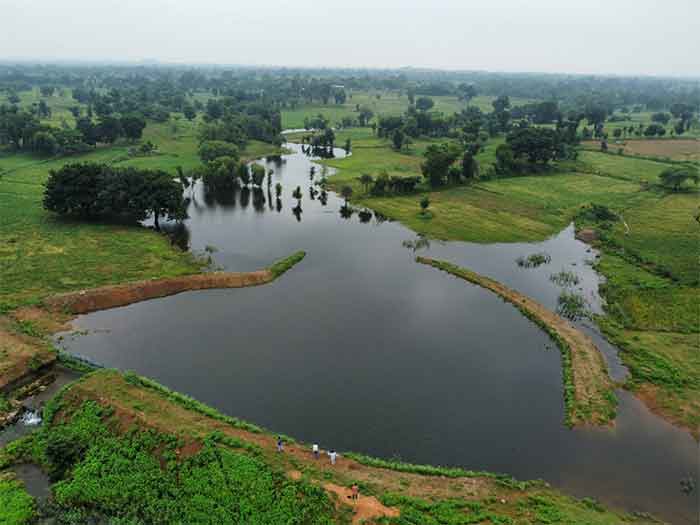
Bundelkhand region, spread over 14 districts of Madhya Pradesh and Uttar Pradesh, is best known for the valiant struggles against colonial rule by Jhansi Ki Rani Lakshmibai and her several equally brave companions like Jhalkaribai. Later this was an area of several efforts by revolutionary freedom fighters like Chandrashekhar Azad. The intenseness of anti-colonial struggles here may partly explain the neglect of development activities during colonial times.
This region has reasonably good rainfall and a network of rivers, yet this came in the news repeatedly due to water-scarcity which is a result of ecological ruin and mismanagement. It was during a year of intense drought that I first visited this region over four decades back and then returned innumerable times, contributing over 500 articles and reports as well as a few booklets. Among other things, I have reported on water conservation, irrigation and dams, land reforms, dalit and tribal communities, mining and forests, mismanagement of development funds and schemes, human rights and dacoit gangs from this region.
Over the years while there have been some good development initiatives, concerns have increased due to increasing dependence of many villages on migrant labor (during the COVID phase a large number of workers including women walked for around 500 km. or more to get back to their villages from various cities), indiscriminate mining and deforestation, many-sided ecological ruin, corruption and mismanagement of development funds, accentuating farmers’ crisis and indebtedness leading in some cases to suicides.
As this once neglected region was highlighted more in media, its problems started receiving more attention, leading to special Bundelkhand packages. This was welcome but unfortunately priorities could not be decided properly and then there was also lack of transparency and a lot of corruption. In fact corruption and wrong priorities are related to each other as the desire of powerful persons for quick money leads them to pick those projects which are likely to result in big commissions to them instead of selecting those which are needed the most for people’s welfare and for environment protection. Hence a lot of money has come in without leading to the desired results of enhancing the welfare of people or protecting environment.
Huge spending on grand schemes like Bundelkhand Expressway and the Ken-Betwa River Link (KBRL) should be questioned, as this money can be much better utilized in thousands of small decentralized projects that directly help the landless rural poor and small farmers. What is more the massive felling of trees and displacement involved in such projects can be avoided.
Hence the way forward is to correct priorities and to adopt highly transparent, participative, democratic and decentralized systems which can curb corruption and ensure proper use of resources. As past experience has shown, priority should be for small-scale water conservation, low-cost and self-reliant, ecologically protective farming, planting of indigenous species of trees, finding ways of promoting productive but at the same ecologically protective use of even small plots of land, improving soil quality, renovation and repair of existing but damaged and depleted water sources etc.
An ongoing program which has been implemented keeping in view these priorities is called Bundelkhand Initiative for Water, Agriculture and Livelihoods ( BIWAL in short). This program, aimed at sustainable improvement of livelihoods of over one lakh farmers in 1000 villages of 7 districts, has focused mainly on natural farming, water conservation, multi-layer vegetable gardens, kitchen gardens and creation of small but dense forests of mixed indigenous species of trees, all this taken up with a combination of close community involvement and professional management.
The lead for this effort has been taken by SRIJAN organization which has formed a consortium with five other organizations CARD, Arunoday, ABSSS, HARTIKA and YKVM, to take forward this effort. Together they have taken forward a program of water conservation and natural farming, already reaching about 30,000 farmers, with very encouraging results and many valuable learning experiences from which government policy can also benefit.
While such efforts are very useful, they cannot do much for the poorest section of landless households. Of course the best hope for such households is land-reform and land-redistribution, but unfortunately the land reform program is not on the agenda today. In its absence still some creative solutions are available, while efforts to put back land reforms on development agenda should also continue. These as well as education and health reform, with emphasis on meeting the needs of the poor, should be the other priorities.
Bharat Dogra is Honorary Convener, Campaign to Save Earth Now. His recent books include India’s Quest for Sustainable Farming and Healthy Food, Planet in Peril and A Day in 2071.







































